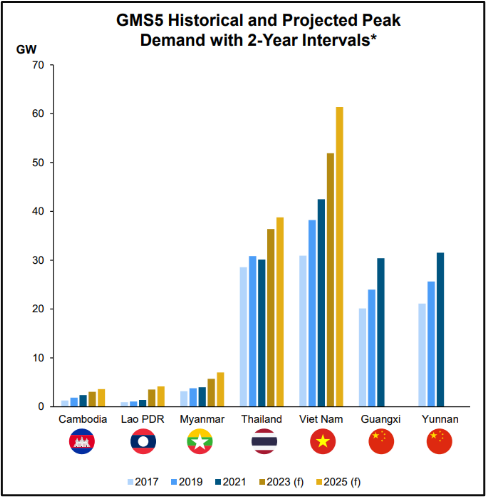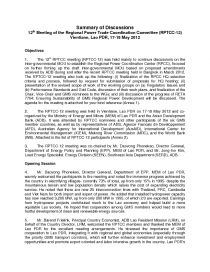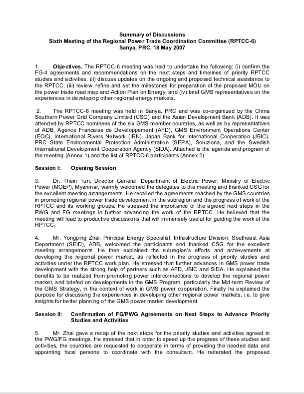
Thirteenth Meeting of the Regional Power Trade Coordination Committee (RPTCC-13)
This is the summary of discussions at the 13th Meeting of the Regional Power Trade Coordination Committee (RPTCC-13) in Yangon, Myanmar on 27 November 2012.
Greater Mekong Subregion countries are in varying stages of economic development but share common goals concerning energy security and environmental protection. Progress have been made in promoting renewable energy, clean fuels, and energy efficiency, but new energy solutions remain crucial to the subregion’s advancement.
The GMS Economic Cooperation Program Strategic Framework 2030 (GMS-2030) emphasizes cross-border power trade, establishment of regional grid codes, development of regional markets, and expanding clean energy investments with a greater role for the private sector.
The Regional Power Trade Coordination Committee (RPTCC) managed regional power trade in the subregion from 2004–2022. In July 2022, at the 29th RPTCC meeting, the committee formally transitioned to the GMS Energy Transition Taskforce (ETTF). Among other things, the transition to ETTF ushers in closer energy cooperation with the Association of Southeast Asian Nations (ASEAN) and its initiatives, such as the ASEAN Power Grid.
Energy consumption in the GMS countries has grown intensively as their economies develop, driven mostly by residential and industrial sectors. Demand is forecasted to increase materially over the medium term.

GMS countries have used different approaches to increase access to reliable, affordable, and low-carbon energy.
See initiatives of the GMS Energy Transition Task Force to promote energy security in the subregion in a sustainable manner.
Related
Key Energy Resources
Focal Persons at the Asian Development Bank
Hyunjung Lee (lead)
Energy Sector Office
Sectors Group
Atsumasa Sakai
Energy Sector Office
Sectors Group
Other Concerned Staff & Consultants
Joao Aleluia
Energy Sector Office
Sectors Group
Architrandi Priambodo
Energy Sector Office
Sectors Group
Jeffrey Almera
Energy Sector Office
Sectors Group
Pinsuda Alexander
Regional Cooperation and Integration Unit
Southeast Asia Department
Rafaelita Jamon
Regional Cooperation and Integration Unit
Southeast Asia Department/GMS Secretariat
Send inquiries to GMS Secretariat.

This is the summary of discussions at the 13th Meeting of the Regional Power Trade Coordination Committee (RPTCC-13) in Yangon, Myanmar on 27 November 2012.

This is the summary of discussions at the 12th Meeting of the Regional Power Trade Coordination Committee (RPTCC-12) in Vientiane, Lao People's Democratic Republic on 17 to 18 May 2012.

The Special 12th RPTCC meeting (RPTCC-12-A) was held mainly to continue discussions on the inter-governmental MOU to establish the Regional Power Coordination Center (RPCC), which will oversee the evolution of the GMS power market toward a more open, but appropriately regulated competitive market.

This publication is a historical summary of progress made in energy cooperation in the GMS since the beginning of the economic cooperation program in 1992.

With increasing fuel demand projected for the Greater Mekong Subregion, biofuels could make a significant contribution to offsetting oil demand and to increased agricultural and rural incomes.